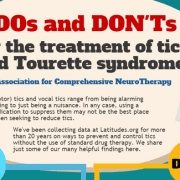Dealing with Misguided Advice for Tourette Syndrome
I received a compelling letter from the mother of a child with Tourette syndrome. It reminded me of what usually happens when parents see physicians regarding this disorder.
Typically, families are told (often in front of the child) that there is nothing they can do for Tourette syndrome except administer drugs and recommend reducing stress. When parents mention natural avenues they are exploring or considering, most doctors flatly discourage such “wasted” endeavors.
These physicians — as well as the mother who authored this letter received by ACN Latitudes — assume that all children are the same, no one can possibly know more than they do, and that parents should not be searching for new and better answers.
I’m sharing the negative letter because at some level, proactive parents may run into this type of discouraging advice, from family members, friends, teachers, and the medical field.
Note that the writer begins her letter by acknowledging that the medication Adderall “brought the tics to the surface” for the first time. Rather than questioning whether this controversial strong stimulant caused the tics—something many parents have noted—she simply accepts that this occurred with Adderall, as if the development of tics were inevitable.
This letter was written in response to our section on finding triggers for TS on ACN’s Latitudes.org website:
My son was diagnosed with Tourette syndrome at age five after being put on Adderall for his ADHD, which brought his tics to the surface. . .
About these parents who walk around with journals looking for what caused tics — first of all, the reason that the one family’s son in your article came home and ticced after a week-long trip is not because of the scents in the house but because he felt comfortable in his house and felt that he could let his tics out. After a child comes home from school and tics explode it is because they have held it in all day as best that they can.
I suggest that these parents face reality and know that the only constant thing about TS is that there is no constant to it. That is why they use the expression wax and waning. . . It’s all about suppressing the tics. They never go away forever.
Instead of having the kids be guinea pigs, these parents need to give them the tools to have a high self confidence level and know that they have TS, it doesn’t have them. My son has many friends and a great feeling of self worth. He knows I would never try to change him. Please feel free to use this in your articles.
This mother made one valid point: children often suppress tics at school and let them out later. But that’s all I will give her. She has no idea why a given child tics in a particular situation, nor does anyone, without knowing the full circumstances. To blindly accept the concept that tics invariably wax and wane makes as much sense as suggesting that blood sugar levels wax and wane, so diabetic should not worry about what they eat. Or, that allergy symptoms wax and wane, so those people should not try to control the dust in their home or their exposure to pollen, even when allergic to these allergens.
Our readers are not trying to “change” their children — they are trying to change the child’s body to be healthier, stronger, more balanced and more resilient.
The term Latitudes was selected for our website and publication because it means “freedom of action or choice.” We advise our readers: Don’t let anyone take that right of choice away from you as you search for the crucial answers our conventional medical community cannot provide.









